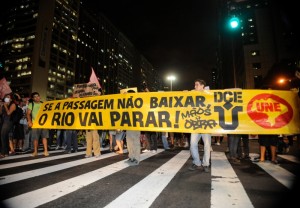Open Veins of Brazil: Tension, perplexity and the (re)emergence of popular protests
By Dr Pia Riggirozzi is a Lecturer in Global Politics at the University of Southampton.
Brazil has posed one of the most puzzling dilemmas for politicians and academics alike: how is it possible that in a country where growth has been sustained for the last decade, where inflation levels have been kept under control, where purchasing power of the average wage has grown in real terms, where unemployment remains at a minimum and where 50 million Brazilians were lifted out of poverty to join the ranks of the ‘new middle class’, a massive popular protest has taken to the streets in twelve cities for the last months? Where does this protest come from? Why has neither the government nor the opposition recognised the latent discontent? How can such discontent occur in a country that has consistently expressed high levels of support to and satisfaction with the government of Dilma Rousseff? Brazil is in tension and it is puzzling.
A spontaneous movement, born mainly out of small groups of middle-class students with unstated support of opposition political parties, took to the streets of Sao Paulo and spread to dozens of cities over the last weeks. The protests were triggered by an increase in the price of an already overwhelmed and poorly maintained public transport. Other issues were coupled to that of public transport, particularly the colossal spending in preparation to the World Cup in 2014. There are parallels to what has been seen in Turkey, not only in terms of the nature and composition of the protest but also in terms of the repression carried out by the military police in Sao Paulo, which is what sparked widespread popular reaction.
This is the biggest popular protest since 1992, when hundreds of thousands of young people took to the streets to demand the departure of President Fernando Collor de Mello, accused of corruption. Before that, in 1984, millions of Brazilians took the streets to demand democratic elections. On both occasions, political parties, leaders and social movements came together in pursuit of what was framed and expressed as a common goal. The protests witnessed in the last weeks are defined by specific claims. The extent to which these particular claims, which lack of any political platform, can grow into a ‘meta-narrative’ or ‘master frame’ of civic opposition in demand of alternative governance is still uncertain.
It became clear that no authorities, political actors or academics expected such a wave. The focus on Brazil as a regional and global success is not misleading: nationally, Brazil has increased the formalisation of workers, increased minimum wage (and purchasing power which has grown over 70 percent in the last ten years), created 19.5 million jobs in the last decade plus the coverage of social policies to combat poverty such as the ‘Bolsa Familia’ allowance. Brazil has also experienced an important rise in the average length of schooling (Lustig 2012). It has successfully reduced poverty from 37.5 percent in 2001 to 20.9 in 2011 while extreme poverty was reduced from 13.2 percent to 6.1 per cent in the same period (CEPAL 2012). Regionally, it has been the motor behind integration processes and South-South cooperation with a focus on health, energy, and infrastructure. Globally, it has been recognised as a rising power with a protagonist role in forums such as the G-20, BRICS, IBSA and in many organisations of the United Nations System.
Much is made of the milestone of becoming the fifth-largest economy on the planet, which is expected to be reached within the decade. Nevertheless, there are still 16 million people living in extreme poverty in Brazil. Furthermore, one of the major challenges still facing Latin America, and Brazil in particular, is how to bring down its high levels of income inequality. Broadly, the income share of the four poorest deciles averages less than 15 percent of total income, with the wealthiest decile accounting for about one third of the total income (CEPAL 2012: 22). This level of inequality, aggravated by widespread levels of corruption, is inconsistent with an economy the size and international presence of that of Brazil. This creates a gap between glory and hell for millions of Brazilians. For academics, this brings up deep questions about quality of democracy and inclusion in post-neoliberal models of governance. So the big, puzzling questions placed at the opening of this comment may not be so puzzling after all. There are unheard voices that, although currently politically unarticulated and socially scattered, are signalling that inclusion and democracy must not be taken for granted and that are pending issues even in the most moderate of the Leftist projects in Latin America.
Dr Pia Riggirozzi is a Lecturer in Global Politics at the University of Southampton. She is currently working on regionalism in Latin America. Dr Riggirozzi attempts to re-examine the various agreements, dynamics and constellations of actors, interests and power resources in the search for governance after neoliberalism, devoting particular attention to how new governance arrangements engage with democracy, inclusion, and the articulation of alternative forms of regional governance.
No comments:
Post a Comment